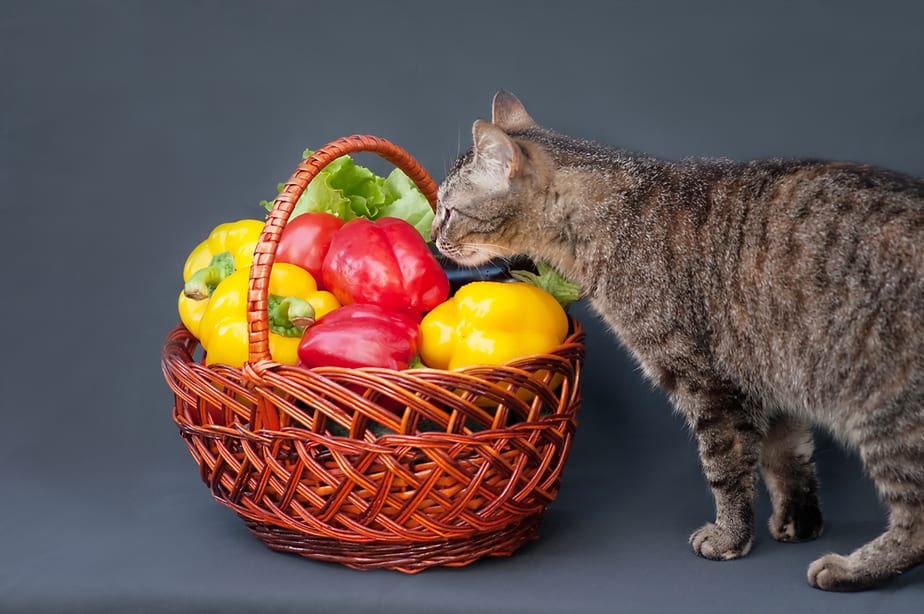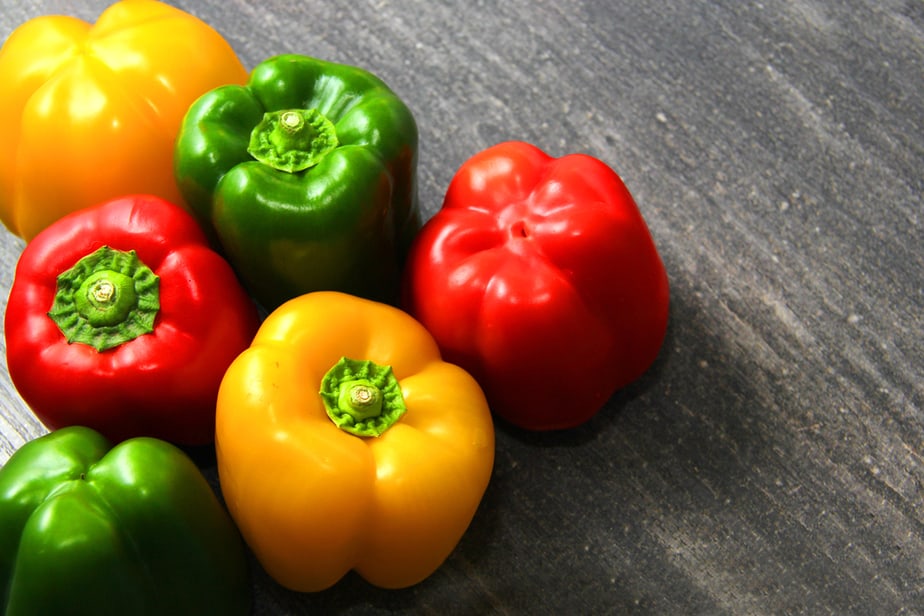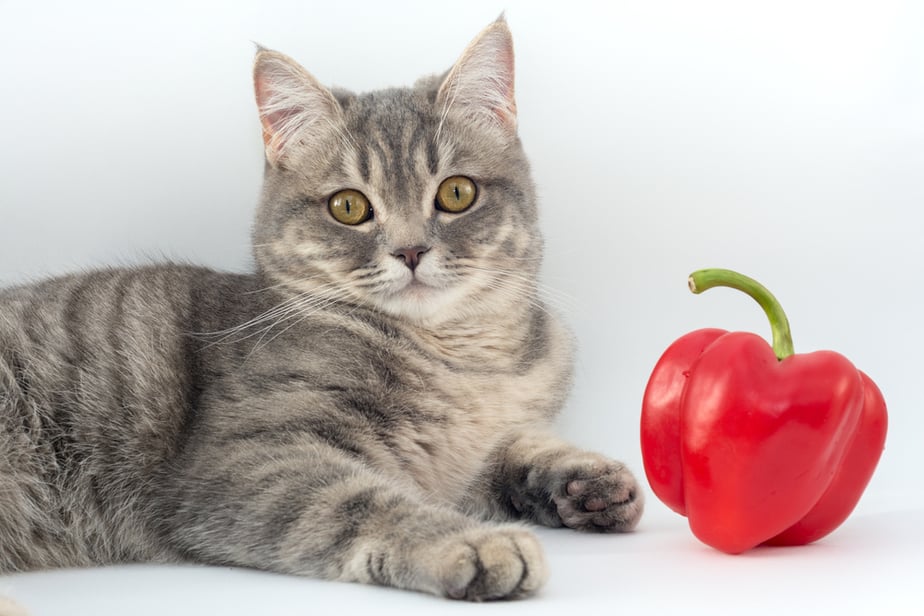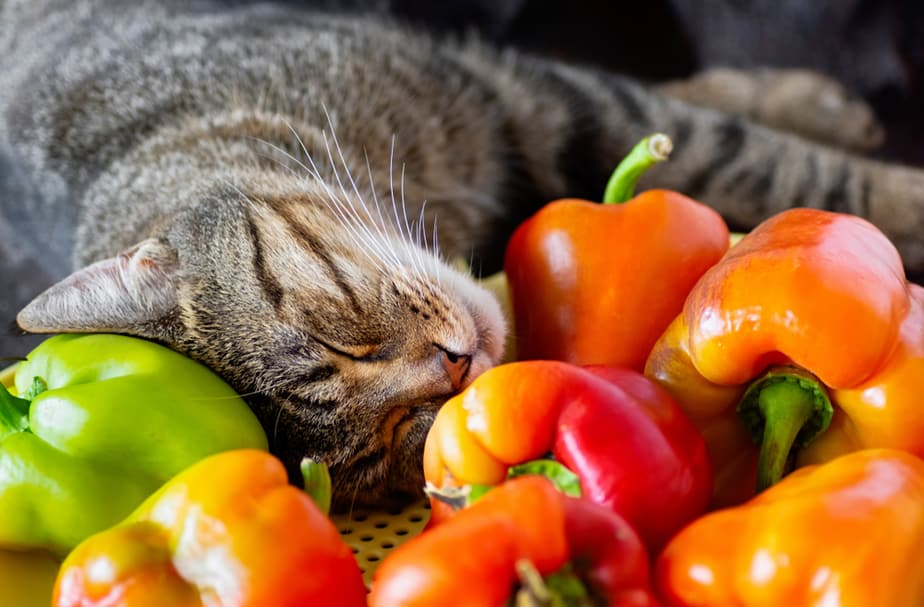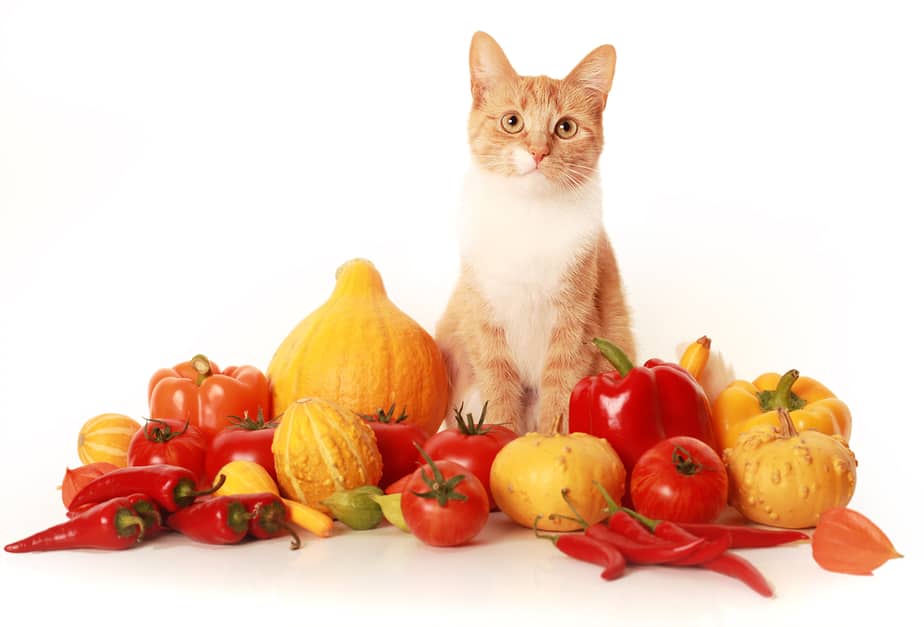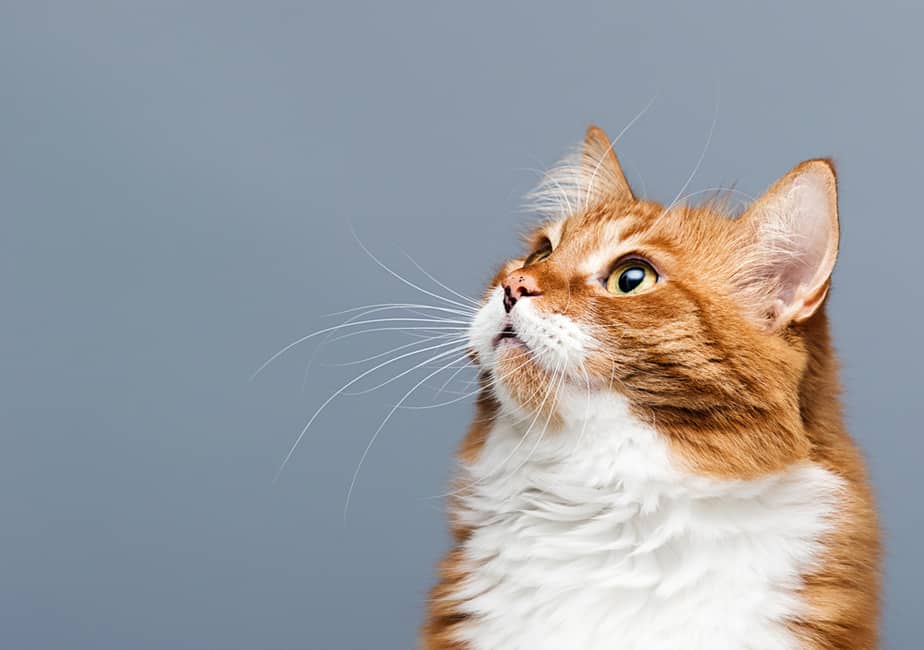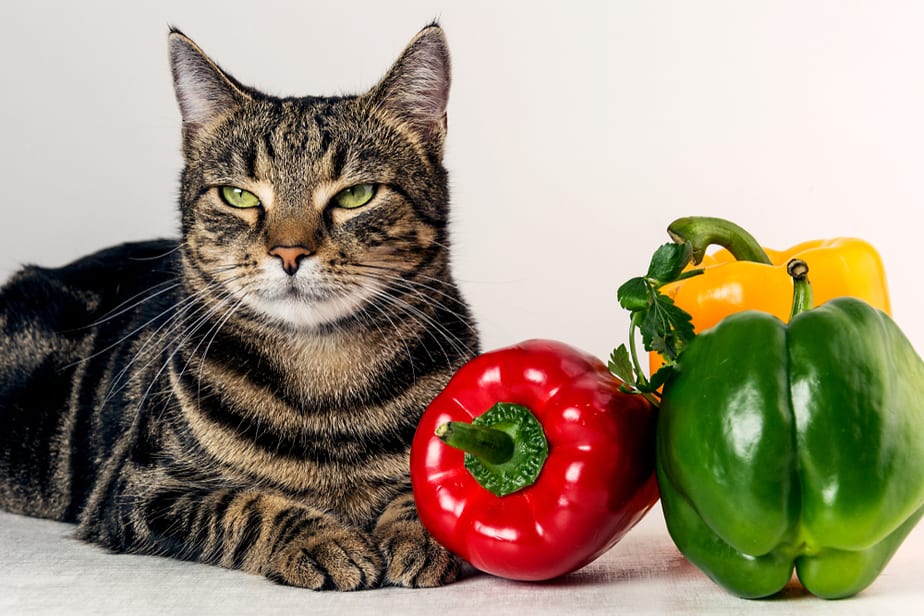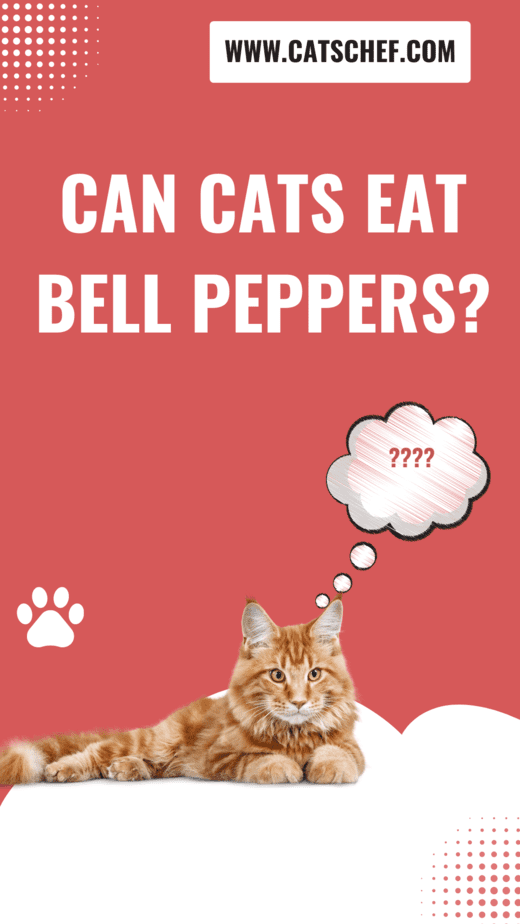📖 Table of Content:
Can cats eat bell peppers?
There’s no way to know what your cat eats behind your back. I can tell you with almost one hundred percent certainty that my cat has tried everything in my household at least once.
To give you a little bit of background, my cat’s name is Salem. He’s a funny little thing and his curiosity is endearing – most of the time.
But what happens when he starts to sniff around the house and ends up eating whatever his little brain thinks to be edible? Well, that’s when I start to lose my mind.
You know how much you love your little fur ball. You don’t want him to get sick because of his inquisitive outbursts. So can your cat eat those big and colorful peppers?
Good thing is that vets and many other cat lovers are here to help you out and stop your panic attack. Quit fretting! We’ll hold your paws through this.
Can cats eat bell peppers?
Source: Shutterstock
Before you go completely bonkers, IT’S OKAY! Bell peppers are safe for your cat to eat.
Just like with many other veggies, your cat can eat them in small amounts. There’s nothing toxic within the bell pepper that could create an imbalance in your cat’s tummy and lead him to the kittie-hospital (or kittie-heaven).
Bell peppers don’t carry any real risk of toxicity for cats or dogs. However, you must know that the tummy of a cat isn’t created to consume large amounts of vegetables or plant foods in general.
Sure, you can use them as a treat from time to time, but not as the main portion of a meal. In other words, don’t serve them an entire bowl of peppers!
Even if your cat seems to enjoy them, it could lead to health problems if you’re not careful with the way you portion these delicacies.
Can cats eat yellow bell peppers?
As you know, there are different types of bell peppers and you could be wondering if your cat can eat a specific type. Your mind is still ringing alarm bells that it could be hazardous for your cat.
That’s why it’s better to be safe and go through all the colors to put your mind at ease.
As with any other vegetable, yellow bell peppers should be consumed in moderation. However, this one, in particular, is much safer for your kitty to eat.
Yellow bell pepper contains a smaller amount of vitamin C and beta-carotene than the other types. So there’s no need for you to panic if he ate it, because he probably didn’t eat a full basket of these.
The yellow bell pepper is in the middle of the ripening stage. This means that it’s more sour than red peppers.
It would be wise to be careful when you keep these around the house, but Salem sneaks around to eat them quite often, and as long as I don’t let him eat them as his main meal of the day, he’s completely fine with that.
Can cats eat red bell peppers?
Source: Shutterstock
For some reason, many cats have a preference for red bell peppers. It wouldn’t surprise me that you’re wondering if your cat can eat bell peppers because he has a penchant for these red veggies.
Your cute friend would rather munch on these than the yellow ones because they are riper and juicer. They’re more flavorful and also have a higher nutritional value.
These peppers possess a higher amount of vitamin C and beta-carotene. This shouldn’t create a problem in your cat’s inner ecosystem, but it could also be hazardous if he eats too much of it.
Give it to your cat in moderation and he should be fine. But if you, at any point, realize that he’s not acting as he usually does, pay a visit to your vet. It couldn’t hurt.
Can cats eat green bell peppers?
Green peppers are at the first stage of ripening.
Your furry friend doesn’t need any secondary vitamins, so the fact that this one doesn’t contain as much vitamin C as the previously mentioned peppers shouldn’t bother you that much.
You don’t need to keep yourself from giving these to your cat. Just restrain yourself from giving an entire handful to your cat and he should be fine.
If he’s a wild little thing, then he’ll just jump on your table and take what he wants from your plate anyway. Before you know it, he’ll be off munching on his little “prey.”
He’ll ignore your pleas because he’s eating like a king at that point. Don’t take that small pleasure away from him, just make sure that he doesn’t eat a whole lot of it.
Do cats even like bell peppers?
Source: Shutterstock
You see your cat munching on his little treats, but you’re not really sure if you should bring vegetables into the game. Well, I can tell you with certainty that bell peppers aren’t the most appetizing thing to a cat.
Cats love to eat things that are rich in flavors. If it’s sweet and crunchy, your cat will enjoy it like his life depended on it.
We can’t really say that bell peppers fall under that category, but your cat could still enjoy his little treat because it’s a surprise for his taste buds. It’s something different and that’ll be interesting to him.
He may run from it the very moment he sniffs it or he could devour it. I guess it all depends on the cat. You know that the little monsters have mood swings that you can’t really foresee!
Are there any health benefits to feeding your cat peppers?
As a cat person, you’ll know all too well that cats don’t listen to you when you tell them to stop eating something. They’re enjoying themselves way too much.
Since we’ve established that your cat can eat bell peppers, you should also know that there are certain benefits to them. If you give your cat peppers in a moderate amount then you should understand why they’re so good for him.
1. Can help with indigestion
Given the high fiber content in this vegetable, it helps with indigestion. It can help humans just as well as cats.
If your cat is facing troubles like incontinence or constipation, a bit of pepper in his diet can put your mind at ease.
This fact could easily convince you to give your furbaby a large amount, but don’t do that. Don’t fall for the temptation. Remember that cats are carnivores – their digestive systems are not meant to handle large quantities of plant matter.
2. Reduces the risk of cancer
The human body can become sick and a playground for different types of cancer when the lifestyle and diet aren’t good enough to keep it healthy. The same thing goes for cats, believe it or not.
We’ve established that cats can eat bell peppers, and that in moderate amounts it can even be beneficial. But here’s a rather interesting find: Peppers can reduce the risk of feline cancer.
Bell peppers are filled with antioxidants like luteolin, zeaxanthin, quercetin, and capsanthin. They’re anti-inflammatory, which helps your cat fight off different types of infections, as well as prevents cancerous cells from developing.
If that isn’t a huge health benefit to those colorful veggies, then I don’t know what is. You’re probably tired of hearing this, but I’ll continue to remind you that a small amount of peppers is perfectly acceptable.
Don’t overdo it and your cat will reap all of these benefits.
3. It’s a low-calorie snack
Source: Shutterstock
Overfeeding your cat is just as much of an issue as underfeeding. The fact that many people are ready to feed their floof whenever he’s hungry is quite concerning.
That’s why it’s such a great thing to bring veggies into his diet sooner rather than later. With only 20 calories per 100g, it’s a low-calorie snack that your cat will enjoy.
It’s something different that’ll keep him interested as well as well-fed. Sometimes, it’s better to give him this than an actual snack made for cats as they’re filled with calories that’ll only promote obesity.
I know that he’s cute when he looks like a walking pillow because of how chubby he’s getting, but it could lead him to kittie-heaven soon if you’re not careful.
4. Boosts hydration
Giving plain water to your cat may become difficult at one point. And if so, your cat will experience dehydration because of his change in appetite. It can be caused by various health issues, but that’s for your vet to figure out.
A way to get more fluids into your cat’s system is to give him bell peppers. 93.9% of bell pepper is water, so should your kitty start to avoid his water bowl, this would be a great supplement.
You just need to understand that this is merely a temporary solution. Your cat has to take in proper water at one point or another. Bell peppers are just there to help you for the short term.
5. Prevents anemia
Anemia in cats can be just as dangerous as it is in humans. If you suspect that your cat may have anemia, you can examine him by yourself before you make the final decision to take him to the vet.
Pale gums, a lack of appetite, and intolerance to exercise are all signs of feline anemia. You’d be surprised to hear that bell peppers can actually help you when it comes to curing this problem.
They’re filled with vitamin C and iron (especially red bell peppers). Vitamin C is great for boosting the immune system and it helps absorb the iron from the vegetable.
You can bring this into his diet right away, simply to prevent anemia from becoming an issue in your little friend. My advice for you is to serve it together with other foods that are filled with vitamin C.
6. Reduces eyesight issues
Source: Shutterstock
If your cat is a little bit older, you may want to consider introducing a small dose of bell peppers into his diet. Can older cats even eat bell peppers, you ask?
He sure can. In this case, age isn’t a factor, portion control is.
Bell peppers are filled with essential carotenoids such as zeaxanthin and lutein. They help stop vascular degeneration. With those properties, it can help your cat see better or even help prevent your cat from becoming visually impaired as he gets older.
Do cats eat plants in the wild?
There are many studies done on cats and what they eat in the wild. When thinking about whether cats can eat bell peppers, think about the fact that fruits and veggies are very common in the wild (but never abundant).
Cats eat them in the wild, too, but never in a huge amount. They’re carnivores who love to hunt down their prey.
Studies show that too much plant matter can cause indigestion because it sticks to a feline’s digestive tract. The nutritional value of plants is also quite small for cats and they don’t care for a huge amount of them.
In nature, the ingestion of plants is commonly accidental. If they do go for a plant, it’s because of the need for something different regarding their food intake. But you can trust a cat’s instinct to keep itself safe.
There is a difference between wild cats and domestic ones. I don’t know about you, but Salem wouldn’t survive a day in the wilderness – although he likes to act as if he’s the world’s toughest predator!
Domestic cats tend to imitate the behavior of their owners. That’s why Salem goes for bell peppers – because he sees me eating them. I had to learn that one the hard way.
Read more: Can Cats Eat Chickpeas? Are They Dangerous Or Healthy?
Is it a nutritional craving?
Source: Shutterstock
Can cats eat bell peppers? It’s a valid question, as there’s a genuine fear that comes with pet diets. You continue to wonder if your cat is going to disappear from your life because of a little misstep.
You’d blame yourself for the rest of your life.
However, it could simply be that he’s malnourished. This could mean that his body doesn’t absorb vitamins and nutrition in a normal manner. So he’ll go out of his way to compensate for the lack of nutrition in his system.
A sign of this is also when your cat starts to go after non-edible things.
You heard that kids eat sand when they’re lacking some minerals. Cats aren’t that different from children. He doesn’t care that he could have issues because of it, he just knows that he’s craving it.
Nonetheless, the issue is resolved the moment you understand that he can eat veggies in smaller amounts. Your kitty cat will be fine, just keep a watchful eye on him and the things he eats.
If you do catch him eating something he shouldn’t, it’s always a great thing to err on the side of caution and call your veterinarian. Until then, you and your cat will most likely be more than fine.
It sure puts my mind at ease because I can see Salem sniffing around as we speak. He’s a troublemaker, but I love him to bits.
At least I know that he can eat his bell peppers now.
Read more: Can Cats Eat Okra? Are These Veggies Safe?
